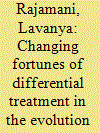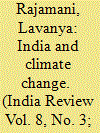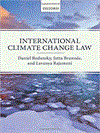|
|
|
Sort Order |
|
|
|
Items / Page
|
|
|
|
|
|
|
| Srl | Item |
| 1 |
ID:
112807


|
|
|
|
|
| Publication |
2012.
|
| Summary/Abstract |
This article traces the evolution of international environmental law and dialogue in the four decades from Stockholm, 1972, to Rio+20, 2012, with a focus on the changing dynamics of the discourse between developed and developing countries, and the corresponding interpretational shifts in the application of differential treatment in international environmental law-climate change law in particular. This article argues that in the first three decades of environmental diplomacy, from 1972 to 2002, the international community witnessed an exponential growth in the number and range of multilateral environmental agreements, an array of tools, techniques and practices, and a rapid expansion of differential treatment in favour of developing countries. Differential treatment in central obligations, albeit disputed from its inception, found pride of place in the Kyoto Protocol negotiated in 1997. The decade that followed, 2002 to 2012, witnessed heightened popular and political mobilization around the climate change issue. But, in response to seemingly intractable difficulties across the North-South and North-North spectrum, it was accompanied by a retreat from differential treatment in central obligations. The battle over the future (or lack thereof) of the Kyoto Protocol, and the recent developments in the climate regime-in particular the 2011 Durban Platform Decision-testify to this retreat from certain variants of differential treatment, and interpretations of equity and common but differentiated responsibilities. An analysis of these developments and the politics that gave rise to them, reveal that while the international regime can survive the erosion of certain limited forms of differential treatment, a wholesale rejection of differential treatment, and of the 'equity' concerns that animate it, would destabilize the normative core of the regime as well as render the climate regime unattractive to key players like India.
|
|
|
|
|
|
|
|
|
|
|
|
|
|
|
|
| 2 |
ID:
091482


|
|
|
|
|
| Publication |
2009.
|
| Summary/Abstract |
From relative obscurity in the late 1980s when it was first discussed in the UN General Assembly,1 the issue of climate change has come, less than two decades later, to be characterized as "the defining human development challenge for the twenty-first century."2 For the years that the international community has engaged on climate change, it has the UN Framework Convention on Climate Change (FCCC)3 and its Kyoto Protocol,4 to show for it. These agreements however do not represent a truly effective and universal solution to address climate change. The emission reduction commitments made under these agreements are inadequate5 and inadequately implemented.6 And, the fundamental premises on which they are based are deeply contested. At the heart of the contestation is a divergence of views between developing and industrial countries on who should bear responsibility, in what measure, and under what conditions to address climate change.
|
|
|
|
|
|
|
|
|
|
|
|
|
|
|
|
| 3 |
ID:
157647


|
|
|
|
|
| Publication |
Oxford, Oxford University Press, 2017.
|
| Description |
xxxix, 374p.pbk
|
| Standard Number |
9780199664306
|
|
|
|
|
|
|
|
|
|
|
|
Copies: C:1/I:0,R:0,Q:0
Circulation
| Accession# | Call# | Current Location | Status | Policy | Location |
| 059312 | 344.046/BOD 059312 | Main | On Shelf | General | |
|
|
|
|
|
|
|
|
|